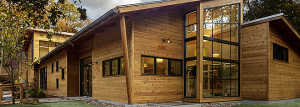Archiscape Blog

From The Architecture of Early Childhood
An article in The Architecture of Early Childhood, January 28, 2014.
A new facility in New Haven embodies the principle of the environment as a teaching tool
The new Friends Center for Children building designed by Patriquin Architects has been occupied now for four months, and the administrators, teachers, parents and children could not be more happy. “We are especially proud of the design features that aid in the education, well-being and delight of the children that learn here everyday,” says Center Executive Director Allyx Schiavone.

The purpose-built facility is located in New Haven amongst acres of protected forest and wetlands, providing a serene and inspiring backdrop for the children’s learning and discovery.

The architecture (form, materials and connections to the outdoors) promotes the child’s inner curiosity and need for adventure, while maintaining the much-needed balance for “homeliness”, comfort and security. Says Arie Mobley, “My daughter is thriving at the Friends Center, where the learning environment is safe, open, comfortable and stimulating.”

The architects worked with the educators in instilling the centers’ principles of community, equality, peace, simplicity and truth. “We worked with the Center’s director and building committee to find ways in which the building would serve as a teaching tool,” says architect Karin Patriquin. A movement studio, an exposed structure, mechanical systems, a rooftop garden and a rain collection and water play area – encourage inquistiveness and holistic learning about construction, the environment and scientific principles.

Designed to meet the U.S. Green Building Council Silver LEED rating, the building includes a car charging station and bicycle racks; and high-efficiency heating and cooling. Attention was also paid to using low VOC materials and finishes to maintain a healthy indoor air quality, while classrooms receive natural light, ventilation and access to the natural outdoors.

It is a thoughtful and considered design that reflects the child as an individual, social, competent and active learner.
Via Patriquin Architects and the Friends Center for Children.
